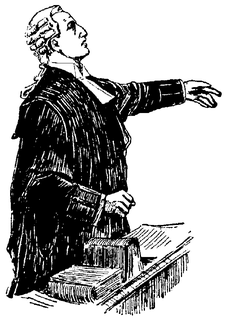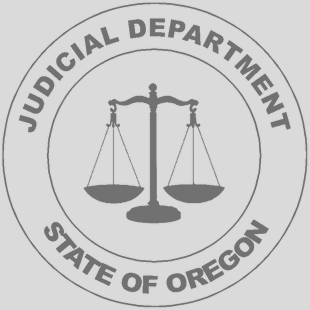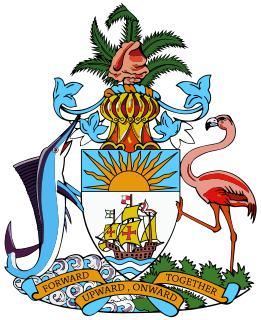
A barrister is a type of lawyer in common law jurisdictions. Barristers mostly specialise in courtroom advocacy and litigation. Their tasks include taking cases in superior courts and tribunals, drafting legal pleadings, researching the philosophy, hypothesis and history of law, and giving expert legal opinions.

The politics of the Falkland Islands takes place in a framework of a constitutional monarchy and parliamentary representative democratic dependency as set out by the constitution, whereby the Governor exercises the duties of head of state in the absence of the monarch and the Chief Executive acts as the head of government, with an elected Legislative Assembly to propose new laws and hold the executive to account.

Sri Lanka is a semi-presidential representative democratic republic, whereby the President of Sri Lanka is both head of state and head of government, and it relies on a multi-party system. Executive power is exercised by the President on the advice of the Prime Minister and the Cabinet of Ministers. Legislative power is vested in the Parliament. For decades, the party system was dominated by the socialist Sri Lanka Freedom Party and the conservative United National Party. The Judiciary is independent of the executive and the legislature. The politics of Sri Lanka reflect the historical and political differences between the three main ethnic groups, the Sinhala majority and the Tamil and Muslim minorities, who are concentrated in the north and east of the island.

A judge is a person who presides over court proceedings, either alone or as a part of a panel of judges. A judge hears all the witnesses and any other evidence presented by the barristers or solicitors of the case, assesses the credibility and arguments of the parties, and then issues a ruling in the case based on their interpretation of the law and their own personal judgment. A judge is expected to conduct the trial impartially and, typically, in an open court.

The United Kingdom has four legal systems, each of which derives from a particular geographical area for a variety of historical reasons: English law, Scots law, Northern Ireland law, and, since 2007, purely Welsh law. Overarching these systems is the law of the United Kingdom, also known as United Kingdom law. UK law arises from laws applying to the United Kingdom and/or its citizens as a whole, most obviously constitutional law, but also other areas, for instance tax law.

The Government of Sri Lanka (GoSL) is a semi-presidential system determined by the Sri Lankan Constitution. It administers the island from both its commercial capital of Colombo and the administrative capital of Sri Jayawardenepura Kotte.
A solicitor is a legal practitioner who traditionally deals with most of the legal matters in some jurisdictions. A person must have legally-defined qualifications, which vary from one jurisdiction to another, to be described as a solicitor and enabled to practise there as such. For example, in England and Wales a solicitor is admitted to practise under the provisions of the Solicitors Act 1974. With some exceptions, practising solicitors must possess a practising certificate. There are many more solicitors than barristers in England; they undertake the general aspects of giving legal advice and conducting legal proceedings.
A bar association is a professional association of lawyers as generally organized in countries following the Anglo-American types of jurisprudence. The word bar is derived from the old English/European custom of using a physical railing to separate the area in which court business is done from the viewing area for the general public.

A justice of the peace (JP) is a judicial officer of a lower or puisne court, elected or appointed by means of a commission to keep the peace. In past centuries the term commissioner of the peace was often used with the same meaning. Depending on the jurisdiction, such justices dispense summary justice or merely deal with local administrative applications in common law jurisdictions. Justices of the peace are appointed or elected from the citizens of the jurisdiction in which they serve, and are usually not required to have any formal legal education in order to qualify for the office. Some jurisdictions have varying forms of training for JPs.
Majuwana Kankanamage Victor Ivan is Sri Lankan journalist. He was a Marxist rebel in his youth and later became the Editor of the controversial Sinhalese newspaper Ravaya. He served as the Editor of the Ravaya for 25 years consecutively since its inception. Victor is an investigative journalist, political critic, a theorist, social activist and also an author of several books.

The Supreme Court of Sri Lanka is the highest court in Sri Lanka and the final judicial instance of record. Established in 1801 and empowered to exercise its powers subject to the provisions of the Constitution of Sri Lanka, the Supreme Court has ultimate appellate jurisdiction in constitutional matters and takes precedence over all lower courts. The Sri Lankan judicial system is a complex blend of common law and civil law. In some cases, such as those involving capital punishment, the decision may be passed on to the President of Sri Lanka for clemency petitions. The current Chief Justice of Sri Lanka is Jayantha Jayasuriya.

South Africa has a 'hybrid' or 'mixed' legal system, formed by the interweaving of a number of distinct legal traditions: a civil law system inherited from the Dutch, a common law system inherited from the British, and a customary law system inherited from indigenous Africans. These traditions have had a complex interrelationship, with the English influence most apparent in procedural aspects of the legal system and methods of adjudication, and the Roman-Dutch influence most visible in its substantive private law. As a general rule, South Africa follows English law in both criminal and civil procedure, company law, constitutional law and the law of evidence; while Roman-Dutch common law is followed in the South African contract law, law of delict (tort), law of persons, law of things, family law, etc. With the commencement in 1994 of the interim Constitution, and in 1997 its replacement, the final Constitution, another strand has been added to this weave.

A supreme court is the highest court within the hierarchy of courts in many legal jurisdictions. Other descriptions for such courts include court of last resort, apex court, and highcourt of appeal. Broadly speaking, the decisions of a supreme court are not subject to further review by any other court. Supreme courts typically function primarily as appellate courts, hearing appeals from decisions of lower trial courts, or from intermediate-level appellate courts.

The Oregon Judicial Department (OJD) is the judicial branch of government of the state of Oregon in the United States. The chief executive of the branch is the Chief Justice of the Oregon Supreme Court. Oregon’s judiciary consists primarily of four different courts: the Oregon Supreme Court, the Oregon Tax Court, the Oregon Court of Appeals, and the Oregon circuit courts. Additionally, the OJD includes the Council on Court Procedures, the Oregon State Bar, Commission on Judicial Fitness and Disability, and the Public Defense Services Commission. Employees of the court are the largest non-union group among state workers.
An Attorney at law in Sri Lanka is the only legal practitioners authorised to represent others in all court of law in the island and are also authorised to give advice regarding any matter of law. Alternative terms include lawyer.
Saleem Marsoof, PC is a Sri Lankan judge and lawyer. He is a judge of the Supreme Court of Sri Lanka and former President of the Court of Appeal. He is also a non-resident Justice of Appeal of the Supreme Court of Fiji.

The basis of the Bahamian Law and legal system lies within the English Common Law tradition. Justices of the Supreme Court, Registrars and Magistrates are all appointed by The Governor-General acting on the advice of the Judicial and Legal Service Commission, which is composed of five individuals who are headed by the Chief Justice as their chairman. The Chief Justice and the Justices of the Court of Appeal, including the President, are appointed by the Governor-General on the recommendation of the Prime Minister after consultation with the Leader of the Opposition. Once appointed, the salaries and other terms of appointment of the Chief Justice, Justices of Appeal and Justices of the Supreme Court cannot be altered to their disadvantage. Justices of the Supreme Court can serve until the age of 65 years and, where agreed among the judge, the Prime Minister and the Leader of the Opposition, may serve until the age of 67. Justices of Appeal can serve until the age of 68 years and, where agreed among the judge, the Prime Minister and the Leader of the Opposition, may serve until the age of 70 years. The law of The Bahamas makes provisions for the appointment of 12 Justices to the Bench of the Supreme Court, inclusive of the Chief Justice, and for five Justices of the Court of Appeal, inclusive of the President. The Chief Justice, as Head of the Judiciary, is an ex officio member of the Court of Appeal, but only sits at the invitation of the President.

The Supreme Court of Mauritius is the highest court of Mauritius and is the final court of appeal in the Mauritian judicial system. It was established in its current form in 1850, replacing the Cour d'Appel established in 1808 during the French administration and has a permanent seat in Port Louis. There is a right of appeal from the Supreme Court of Mauritius directly to the Judicial Committee of the Privy Council in London. On 30 July 2020, a new building was inaugurated jointly by Indian Prime Minister Narendra Modi and Mauritian Prime Minister Pravind Jugnauth.
The Judiciary of Sri Lanka are the civil and criminal courts responsible for the administration of justice in Sri Lanka. The Constitution of Sri Lanka defines courts as independent institutions within the traditional framework of checks and balances. They apply Sri Lankan Law which is an amalgam of English common law, Roman-Dutch civil law and Customary Law; and are established under the Judicature Act No 02 of 1978 of the Parliament of Sri Lanka.
Kankanithanthri T. Chitrasiri is a sitting Puisne Justice of the Supreme Court of Sri Lanka who was appointed by President Maithripala Sirisena in 2016 to replace Justice Rohini Marasinghe. He was Justice of the Court of Appeal of Sri Lanka, Judge of the High Court and a Magistrate.














